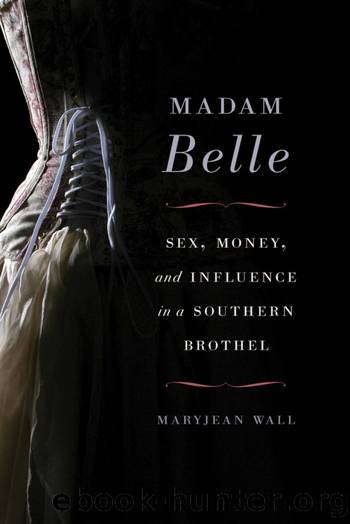Madam Belle: Sex, Money, and Influence in a Southern Brothel by Maryjean Wall

Author:Maryjean Wall [Wall, Maryjean]
Language: eng
Format: epub
Tags: Social Science, Prostitution & Sex Trade, history, United States, State & Local, South (AL; AR; FL; GA; KY; LA; MS; NC; SC; TN; VA; WV), Sports & Recreation, Animal Sports, Horse Racing
ISBN: 9780813147079
Google: R4ZaBAAAQBAJ
Publisher: University Press of Kentucky
Published: 2014-10-14T00:11:11.080522+00:00
chapter EIGHT
A Uniquely Powerful Woman in a Changing City
Belleâs business was thriving at her whorehouse bought with Singerly money. Meanwhile, the Singerly brothers had grown restless in another phase of their sporting life. No longer content with owning only trotters, they followed a popular trend among wealthy men and got into Thoroughbred racing. William won the nationâs premier horse race at that time, the Futurity, run at Coney Island in New York. But the wake of scandals that trailed William and George through Thoroughbred racing reflected the very reasons why the sport needed reform.
Thoroughbred racing in the United States had reached the highest popularity in its history during the Gay Nineties. The reasons were many. Ordinary folk had more time for leisure, and many were choosing to spend this time at Thoroughbred racecourses. Rising attendance brought in more bookmakers to handle the increased betting. Racecourses realized huge profits licensing these on-track bookmakers, the only form of wagering then in use at tracks. The tracks turned a portion of their profits into richer purses for their marquee races. This in turn drew more people to the sport.
Racing was prospering. But this prosperity revealed a darker side: a criminal element drawn to the sport to make big money. Rumors flew at the tracks of fixed races, doped-up horses, and all sorts of betting coups. The wealthiest men participating in New York racing hoped to hold off social reformers and legislators when in 1894 they organized a governing body they called the Jockey Club. It took over the licensing of jockeys and all others participating at New York tracks. The Jockey Club centralized authority. Unfortunately, it came into existence two years too late to deal with the scandal revealed after William Singerly won the Futurity with a long shot named Morello.
Morello does not stand out in the annals of Thoroughbred racing as a memorable horse. His only remarkable moment occurred when he won the 1892 Futurity. After that, the horse slipped into obscurity. Singerly also was obscure in Thoroughbred racing when on the morning of this Futurity, he assembled two hundred friends in Philadelphia for a train ride to see Morello race in New York. After the horse won, Singerly and his friends did not linger in New York for celebrations or interviews. They returned immediately to Philadelphia.1
A rather provincial New York press was scrambling to figure out who Singerly wasâa newspaper publisher in Philadelphia, you say? Moreover, the press failed to understand why Singerly had not been listed in the program as Morelloâs owner. A most interesting story of duplicity began to unravel. Morello raced in the name of Frank Van Ness. Yet it appears from news accounts that people were aware that Morelloâs owner was in fact Singerly. The New York Times commenced an investigation and discovered that Singerly was not listed as owner because he was ineligible to race at Coney Island. The track operated under the governance of a body known as the Board of Control, a precursor of the Jockey Club.
Download
This site does not store any files on its server. We only index and link to content provided by other sites. Please contact the content providers to delete copyright contents if any and email us, we'll remove relevant links or contents immediately.
Machine Learning at Scale with H2O by Gregory Keys | David Whiting(4313)
Never by Ken Follett(3957)
Harry Potter and the Goblet Of Fire by J.K. Rowling(3859)
Fairy Tale by Stephen King(3399)
Unfinished: A Memoir by Priyanka Chopra Jonas(3391)
The Man Who Died Twice by Richard Osman(3080)
Will by Will Smith(2920)
It Starts With Us (It Ends with Us #2) by Colleen Hoover(2367)
Rationality by Steven Pinker(2366)
Can't Hurt Me: Master Your Mind and Defy the Odds - Clean Edition by David Goggins(2342)
The Dark Hours by Michael Connelly(2311)
The Storyteller by Dave Grohl(2236)
Friends, Lovers, and the Big Terrible Thing by Matthew Perry(2230)
The Dawn of Everything: A New History of Humanity by David Graeber & David Wengrow(2210)
The Becoming by Nora Roberts(2203)
The Stranger in the Lifeboat by Mitch Albom(2123)
Cloud Cuckoo Land by Anthony Doerr(2114)
Love on the Brain by Ali Hazelwood(2078)
Einstein: His Life and Universe by Walter Isaacson(2026)
